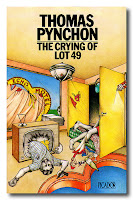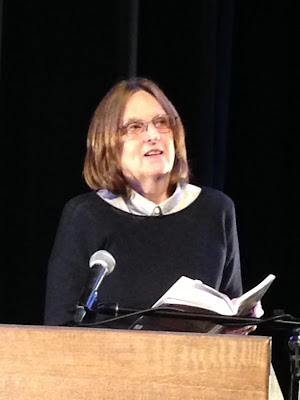
John suggested this novel set in an Irish border town in the early 60s, which begins, 'When I was a young lad twenty or thirty or forty years ago...' Thus Francie Brady establishes himself as a severely unreliable narrator before embarking on a tale of the small-town ostracisation of his family for the drunkenness of his father Benny and the unstable mental state of his mother and the resulting squalor of their life, and his own reaction and resistance to the ostracisation, which ends in horrific violence and incarceration.
John said there were various questions that could be asked about this book. Is it a depiction of how to create a psychopath, or is it more simply a portrayal of the brutal lives that some people still led in Ireland in the early 60s? Or is it an exploration of the effects of English colonisation of Ireland and of Anglo-American culture on Irish small-town life? Francie's main enemies, the Nugents, are strongly anglicised: they have lived in England and their son Phillip once attended an English private school, turning up at first in his pristine uniform which marks him out as different, superior and privileged. Along with the Purcells, the parents of Francie's friend Joe, they aspire to an English middle-class lifestyle, with over-neat houses and dinner parties. The trouble between Francie and the Nugents begins when Mrs Nugent calls Francie's family pigs, a historic English insult for the Irish.
I said that I thought the book was about Irish identity and the ambivalence and confusion of realities created by the imposition of English culture on an older, more rural Ireland, and I thought it therefore significant that the novel is set in a southern Irish town near the border with Northern Ireland. Francie permanently longs for a lost past located in old-fashioned romantic love and family and preserved in his mother's romanticised tales of his parents' honeymoon - tales which will turn out to contrast starkly with the reality - and struggles always, in spite of the reality, to regard himself and his parents in this light. Yet he is deeply colonised by Anglo-American culture. His mental landscape is peopled by characters from English comics and American films, and his acts of transgression and violence do indeed have a horrifically comic-book character. It is significant that the anglicised Phillip Nugent is the possessor of a large collection of such comics, all of them preserved in a pristine state, which Francie envies and tricks out of him, the act which precipitates all the trouble between himself and the Nugents. His aggression towards the Nugents is clearly based in part in envy: he has unbidden and ambivalent fantasies in which they tell him they know he wants to belong to them and in which, to his disgust, Mrs Nugent breastfeeds him. He shares in the small-town admiration of his Uncle Alo, who has left for England and is supposed to have done so well there, and the unmasking of Alo is one of the precipitating factors in Francie's downward spiral. He has his own snobbery about traditional country people. He notes that 'a tractor went farting off home to the mountains with a trailer of muck', a derisory image contrasting sharply with a similar but romanticised image of 'an ass and cart going off into the green mountains', by which Francie is seduced, on the cover of Phillip Nugent's music book, nostalgically titled
Emerald Gems of Ireland. It is significant too that it is Phillip, identified with appropriating colonisers, who, while possessing a library of Anglo-American comic culture, is also the possessor of this repository of Irish traditional ballads, including the one that Francie poignantly identifies with his mother. Francie holds particular scorn for Mrs Nugent's country-living brother, 'carrot-head Buttsy ... in a cottage that stank of turfsmoke and horsedung'. Buttsy's violent and uncouth pursuit of Francie gives the lie to the civilisation of the Nugents, the ambiguity of which is already established in their having to have returned to Ireland - a failure paralleling that of Francie's Uncle Alo. Yet the hypocrisies of the new society are more than matched by those of the older Ireland, so widely romanticised yet a seat of devastating damage: the damage to Francie's family is rooted in the trauma of his father's childhood in a Catholic Belfast orphanage, a pattern that will be repeated when Francie is sent in turn to a children's home and is interfered with by a priest.
All of this ambiguity is carried by the fact that Francie constantly slips into immature fantasies which in the end he turns into horrific reality. It is a shock to the reader to realise, when he returns from the reform school wanting to take up again his childish games with Joe, that Joe has gone on to secondary school and has outgrown such things, and to register Francie's arrested development - signalled in the opening 'When I was a lad twenty or thirty or forty years ago' (which also prefigures the book's theme of confused history). I saw Francie's immaturity as representing the infantilisation of a people by both colonisation and religion, and it was noted in the group that Francie's name for his abuser in the reform school is 'Tiddly', neatly encapsulating the immaturity of a (historically all-powerful) Catholic priesthood.
After John's first question, Jenny had jumped in and said strongly that she didn't think that Francie is a psychopath - she thought that his behaviour is induced by circumstances and the way he is treated - and indeed his nostalgic longings and attachment to natural beauty, such as the single snowdrop that grows in the alleyway, militate against such an interpretation. However it was clear that Jenny had read the book as a psychological study. Others, in particular Clare, subscribed to this reading, and I agreed that the book did work beautifully on a psychological level as well as the political. Everyone agreed that the voice was exceptionally acute, that the book was in fact a tour de force of voice and prose style.
One question of John's that we didn't perhaps explore in enough depth was that of Francie's verbal charm, which he uses to manipulate people. Group members felt that the idea that he charms them is just another of Francie's fantasies, and that in reality they patronise or are frightened of him. I feel it's more complicated than that, but was unable to articulate why in the meeting. Francie's verbal wit is indeed quaint and acute. He comes upon some gossipy housewives in the grocery store: 'What's this? I says, the woman with three heads? When I said that they weren't so bad. Flick - back come the smiles.' I thought there was an implication that people were indeed momentarily disarmed by him, creating a cognitive dissonance (for both the characters and the reader) which in itself induces fear in others. In other words, Francie uses quaint Irish charm as a threatening weapon against his oppressors. John said that when he first read the book, several years ago, he was indeed charmed and saw Francie's actions as schoolboy pranks until they turn horrifically violent, a view that is reflected in reviews of the time. This time, he said, knowing the ending, he found all of it much more horrific.
Trevor noted that, unusually for Irish Catholics, none of the families, even the Bradys, has more than one child, and it was agreed that this is because this is not a social-realist novel, but one in which each character is some kind of representation.
Doug said that he was very impressed by the novel, but he could hardly say he enjoyed it as he found it so horrific, a view that was shared - interestingly enough, particularly among the men.
Our archive discussions can be found here and a list of the books we have discussed, with links to the discussions, here












































